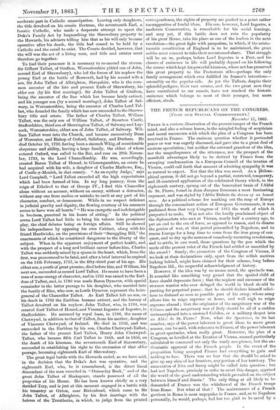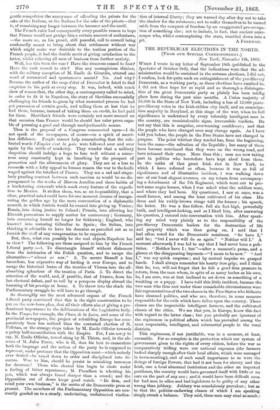November 17, 1863. TRERE is a curious illustration of the
present temper of the French mind, and also a solemn lesson, in the mingled feeling of scepticism and moral unconcern with which the plan of a Congress has been received in France. The ominous question whether it portended peace or war was eagerly discussed, and gave rim to a great deal of anxious speculation ; but neither the outward grandeur of the idea, nor the magniloquence of the utterance, nor the prospect of the manifold advantages likely to be derived by France from the sweeping" condemnation in a European Council of the treaties of Vienna, could call forth that amount of admiring sympathy it was so natural to expect. Not that the idea was novel. As a Itbiloao- phical system, it did not go beyond a partial, restricted, temporary, and ill-contrived application of the celebrated theory which, in the eighteenth century, sprung out of the benevolent brain of PAbbe de St. Pierre, found in Jean Jacques Rousseau a most fascinating exponent, and was styled by rAbbe Dubois the dream of an honest man. As a political scheme for marking out the map of Europe through the concomitant action of European Governments, it was purloined from that very Congress of 1815 the work of which it purported to undo. Was not also the loudly proclaimed object of the diplomatists who met at Vienna, nearly half a century ago, to put an end to the era of force, as opposed to reason, and to disarm the genius of war, at that period personified by Napoleon, and to rescue Europe for a long time to come from the iron grasp of con • quest, and to dry up the sources of ceaselessly-recurring revolutions, and to settle, in one word, those questions by the pen which the uncle of the present ruler of the French had settled or unsettled by the sword ? Surely, the promoters of the Congress of Vienna, if we look at their declarations only, apart from the selfish motives lurking behina, might have claimed for their scheme, long before Napoleon 111., the respectful acknowledgment of history.
However, if the idea was by no means novel, the spectacle was. It sounded like something very grand that the spoiled child of force should deprecate force ; that the nephew and successor of the sternest warrior who ever deluged the world in blood should be panting for perpetual peace ; that he should declare himself solici- tous to disband as soon as possible part of his army, whose army allows him to reign supreme at home, and well nigh to reign supreme abroad ; that the originator of the sanguinary war of the Crimea and the sanguinary war of Italy should be all of a sudden metamorphosed into a crowned Cobden, or a military despot into an AUK! de St. Pierre! Now, what the Spectator, in its last number, says of the power inherent in great ideas to move great masses, can be said, with reference to France, of the power inherent in great spectacles, when really great. Moreover, the plan of a Congress, as levelled at the Treaties of Vienna, seemed particularly calculated to command not only the ready acceptance, but the en- thusiastic approval of the French people. In the event of the proposition being accepted France had everything to gain and nothing to lose. There was no fear that she should be asked to give up any slice of her frontiers, any portion of her territory. The annexation of Nice and Savoy might be called into question ; but had not Napoleon, precisely in order to avert this danger, apprised the world of the good understanding which prevailed on the subject between himself and Russia? The only thing at all likely to be demanded of France was the withdrawal of the French troops from Rome. But what of that ? 'The maintenance of a French garrison in Rome is most unpopular in France, and, as to Napoleon personally, he would, perhaps, feel but too glad to be saved by a
gentle compulsion the annoyance of offending the priests for the sake of the Italians, or the Italians for the sake of the priests—that is, of remaining any longer between the hammer and the anvil.
The French ruler had consequently every possible reason to hope that France would not grudge him a certain amount of enthusiasm, —the more so, as his proud, still peaceful, call to council being confessedly meant to bring about that settlement without war which might make war desirable to the restless portion of the French people, it had the double merit of giving satisfaction to the latter, whilst relieving all men of business from further anxiety.
Well, has this been the case? Have the timorous ceased to fear? Have the rash ceased to stir? Has any unsuspicious thinker, with the solitary exception of M. Emile de Girardin, uttered one
word of unreserved and spontaneous assent? No. And why? Because the author of the coup (Mat of December is fated to find
suspicion in his path at every step. It was, indeed, with much show of reason that, the other day, a contemporary called to mind, in order to fit it to Napoleon, the story of Sheridan successfully challenging his friends to guess by what unwonted process he had got possession of certain goods, and telling them at last that he had them, because, instead of taking them on credit, he had paid for them. Sheridan's friends were certainly not more amazed on that occasion than France would be should her ruler prove capa- ble of pursuing a good end through unobjectionable means.
Thus is the proposal of a Congress commented upon—I do not speak of the newspapers, of course—in a spirit of merci- less diffidence. People cannot help remembering that the cele- brated words l'Empire c'est in pain were followed over and over again by the rattle of musketry. They wonder that a military despotism should indulge a hope to fare well without a nume- rous army constantly kept in breathing by the prospect of promotion and the allurements of glory. They are at a loss to reconciie with a lofty appeal to human reason the war to the knife waged against the intellect of France. They see a sad and singu- larly puzzling contrast between such maxima as would be no dis- paragement to the works of Marcus Aurelius and those habits of a huckstering statecraft which mark every feature of the expedi- tion to Mexico. It strikes them, too, as an impossibility, that a clear, practical mind could have for one moment dreams of inaugu- rating the golden age by the mere convocation of a diplomatic council, in which. Austria would be coaxed into giving up Venice ; Russia, into doing justice to Poland ; Prussia, into allowing her Rhenish possessions to supply matter for controversy ; Germany,
into concerning herself no longer for Schleswig; England, who knows? into restoring Gibraltar to Spain ; the Sultan, into thinking it advisable to have his domains so parcelled out as to furnish the stuff of any compensation to be required.
But, then, what can possibly be the real objects Napoleon has in view? The following are those assigned to him by the French Liberal party :-1. To disentangle himself without dishonour from the intricacies of the Polish question, and to escape the alternative—" silence or war." 2. To secure himself a less hazardous, less expensive way of lording it over Europe, and to merge the historical lustre of the treaties of Vienna into the all- absorbing splendour of the treaties of Paris. 3. To direct the attention of the world, and, if possible, that of France, from his last electoral defeat, and to veil by a pompous display abroad the lessening of his prestige at home. 4. To throw into the shade the Parliamentary struggle he will have to go through.
So thoroughly are the most advanced organs of the French Liberal party convinced that this is the right construction to be put on the new-born plan, that all their efforts aim at giving a pre- dominant importance to the deliberations of the Legislative body. In the Temps, for example, the l'hare de la Loire, and some of the provincial newspapers, the project of rebuilding Europe has com- paratively been less noticed than the contested election of M. Pelletan, or the strange steps taken by M. Emile °Myles towards a paltry half-reconciliation with the Empire. For, I am sorry to say, M. Emile 011ivier, towed along by M. Thiess, and, in the ab- sence of M. Jules Favre, who is ill, does his best to emasculate both the language and the action of the party he is supposed to represent, under pretence that the Opposition must—which nobody ever denied—be toned down to order and disciplined into de- corum. Woe to him, should he persist in mistaking tameness for decorum ! Those who elected him begin to chafe under a feeling of bitter repentance ; N. Proudhon is whetting his pen, which was always found sharper than a sword ; and the Opposition out of doors keeps good watch. "Be firm, and mind your own business," is the motto of the Democratic press at present. The members of the Parliamentary Opposition are con- stantly goaded on to a steady, undeviating, undistracted vindica-
tion of internal liberty; they are warned day after day not to take the shadow for the substance; not to suffer themselves to be turned aside from the conquest of freedom by an exaggerated pre-occupa- tion of something else ; not to imitate, in fact, that ancient astro- nomer who whiht contemplating the stars, tumbled down into a































 Previous page
Previous page